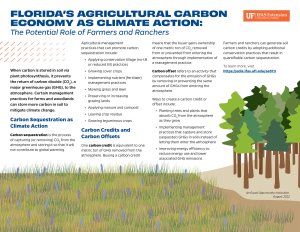March FloridAgriculture eNewsletter
Carbon sequestration is the process of capturing and storing carbon dioxide from the atmosphere. This process has become popular as a method to reducing our carbon footprint and it has been taken a step further with the development of a carbon economy. Low carbon economy refers to the ecological economy based on low energy consumption and low pollution. The concept behind the creating and trading of carbon credits is to incentivize the implementation of management practices focused on the storage of carbon in the soil.
The ability to store carbon in the soil helps remove CO2 from the atmosphere, through a process called carbon sequestration. Agriculture and natural resource management practices can facilitate carbon sequestration. These practices often align with current Best Management Practices (BMPs) including cover cropping, crop rotation, no-till and refined nutrient management.
Farmers and ranchers can generate soil carbon credits by adopting conservation practices that result in quantifiable carbon sequestration. Carbon credits are exchanged through carbon markets and payments vary by many factors, including biophysical characteristics and management practices.
A recent UF/IFAS publication on Florida’s agricultural carbon economy and the potential role of farmers and ranchers can be found here.

